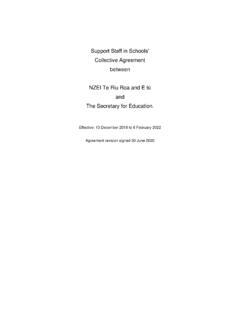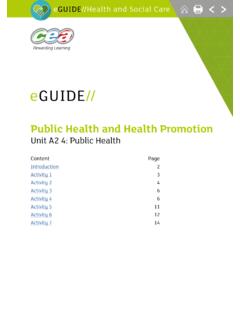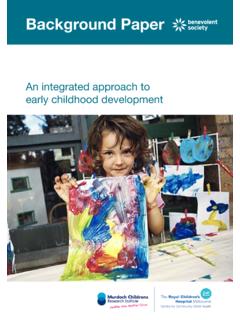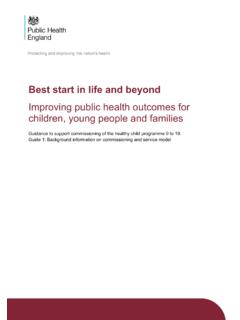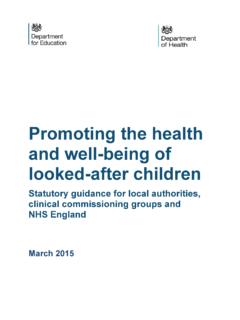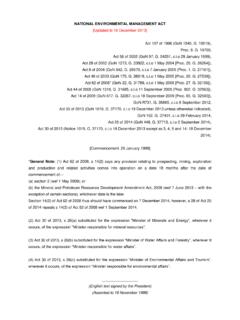Transcription of Licensing Criteria for Early Childhood Education & Care ...
1 Licensing Criteria for Early Childhood Education & Care Services 2008. and Early Childhood Education Curriculum Framework AS AMENDED 1 JANUARY 2022. Published by the Ministry of Education , New Zealand January 2022. M tauranga House 33 Bowen Street PO Box 1666, Thorndon Wellington 6140, New Zealand. Crown copyright 2018. ISBN 978-0-478-13926-6 (Online). Licensing Criteria FOR Early Childhood Education AND CARE SERVICES 2008 3. AND Early Childhood Education CURRICULUM FRAMEWORK. Introduction This booklet contains the Licensing Criteria for Early Childhood Education and Care Centres 2008, and the Early Childhood Education Curriculum Framework (on the inside back cover). These two documents form part of the regulatory framework for Early Childhood Education (ECE). The Licensing Criteria are deemed regulations prescribed by the Minister of Education . The Criteria are used by the Secretary for Education to assess compliance with regulated standards of Education and care.
2 There are no Criteria associated with the Qualifications, ratios, and service size standard, as compliance with this standard is linked to schedules contained in the Education ( Early Childhood Services) regulations 2008. ECE services must meet the Licensing Criteria as well as the other regulatory requirements contained in the regulations in order to gain and maintain a licence to operate. The Criteria should therefore be read in conjunction with the Education ( Early Childhood Services) regulations 2008. The curriculum framework is prescribed by the Minister of Education . It formalises Government's expectations and guides all curricula and programmes across the Early Childhood Education sector. The Early Childhood Education Curriculum Framework is made up of the English and te reo M ori versions of the Principles and Strands from the Early Childhood curriculum Te Wh riki: He Wh riki M tauranga m ng Mokopuna o Aotearoa, as well as an interpretation of the Strands to be used in ng.
3 K hanga reo affiliated with Te K hanga Reo National Trust. 4 Licensing Criteria FOR Early Childhood Education AND CARE SERVICES 2008. AND Early Childhood Education CURRICULUM FRAMEWORK. PURSUANT TO REGULATION 41 OF THE Education ( Early Childhood SERVICES). regulations 2008, THE MINISTER OF Education PRESCRIBES THE FOLLOWING Criteria . Contents 1 Title and commencement 5. 2 Application 5. 3 Explanatory information 5. 4 Interpretation 6. 5 Purpose 8. 6 Criteria to assess Curriculum standard 9. C1 C4 Professional practice 10. C5 C6 Culture and identity 10. C7 C10 Children as learners 10. C11 C13 Working with others 11. 7 Criteria to assess Premises and facilities standard 12. PF1 PF14 General 12. PF15 PF17 Food preparation and eating spaces 15. PF18 PF23 Toilet and handwashing facilities 15. PF24 PF28 Other sanitary facilities 16. PF29 PF38 Sleep 17. 8 Criteria to assess health and safety practices standard 19. HS1 HS3 Hygiene 19. HS4 HS8 Emergencies 20. HS9 HS11 Sleep 21.
4 HS12 HS18 Hazards and excursions 22. HS19 HS23 Food and drink 24. HS24 HS30 Child health and wellbeing 24. HS31 HS33 Child protection 26. HS34 Notification 26. 9 Criteria to assess Governance, management and administration standard 27. GMA1 GMA4 Parent involvement and information 28. GMA5 GMA7A Professional practices 30. GMA8 GMA12 Planning and documentation 31. 10 Appendix 1: First Aid kit requirements for criterion PF28 33. 11 Appendix 2: Infectious diseases for criterion HS26 34. 12 Appendix 3: Categories of medicine and written authority required from parents for criterion HS28 36. Notice of Curriculum Framework 37. Licensing Criteria FOR Early Childhood Education AND CARE SERVICES 2008 5. AND Early Childhood Education CURRICULUM FRAMEWORK. Title and commencement 1 Title and commencement These Criteria may be cited as the Licensing Criteria for Early Childhood Education and Care Centres 2008. These Criteria came into force on 1 December 2008. Since then, there have been 8 sets of amendments.
5 These took place on 28 August 2009 , 21 July 2011, 21 May 2015, 26 February 2016, 27 May 2016, 25 January 2021, 31 August 2021 and 1 January 2022. 2 Application These Criteria apply to all Early Childhood Education and care centres (centre-based ECE. services) as defined in Section 310 of the Education Act 1989, EXCEPT for centres operating under Limited Attendance Conditions, and K hanga Reo affiliated with Te K hanga Reo National Trust. 3 Explanatory information In these Criteria : (a) a copy of the minimum standard in each regulation is set out, followed by the Criteria against which compliance will be assessed;. (b) any specific documentation requirements to demonstrate compliance with a criterion are set out below the relevant criterion;. (c) a hash symbol (#) indicates a requirement upon which a service provider may be required under regulation 55 to obtain a report from a Public health Unit; and (d) a sun symbol (R) indicates a requirement that may be located outside the premises (as defined in the interpretations section, clause 4(j)), if services can demonstrate they have adequate access to the required facilities.
6 Adequate access in this context means that the facility: i) can perform its function to the same level as if it were located on the premises;. ii) can be used by the service whenever they require it;. iii) is located close enough to the premises to ensure that people who need to use it can do so without difficulty, taking into account distance and comfort (such as not getting wet in bad weather); and iv) if it is to be used by children, may be used by them in a manner that ensures their safety, supervision, and dignity can be assured. 6 Licensing Criteria FOR Early Childhood Education AND CARE SERVICES 2008. AND Early Childhood Education CURRICULUM FRAMEWORK. Title and commencement 4 Interpretation For the purpose of these Criteria , unless the context indicates otherwise: (a) adults providing Education and care means kaiako, teachers, supervisors, parent helpers, kaiawhina, fa'iaoga, or other adults who have a designated role of providing Education and care to children at a service and are included in required adult:child ratios.
7 (b) assessment means the process of noticing children's learning, recognising its significance, and responding in ways that foster further learning. It includes documenting some, but not necessarily all, of what and how children are learning in order to inform teaching, and make learning visible;. (c) culture means the understandings, patterns of behaviour, practices, and values shared by a group of people;. (d) excursion means . i. being outside the licensed premises whilst receiving Education and care from the service; but ii. does not include an excursion for the purposes of emergency evacuations, drills or the receipt of urgent medical attention. iii. regular excursion means excursions that parents have agreed to at the time of their child's enrolment, that are part of an ongoing planned and consistent routine of Education and care. iv. special excursion means excursions that parents have agreed to prior to the excursion taking place, that are not a regular excursion.
8 Licensing Criteria FOR Early Childhood Education AND CARE SERVICES 2008 7. AND Early Childhood Education CURRICULUM FRAMEWORK. (e) existing service means an Early Childhood service deemed to have been issued a licence under section 319K(1) of the Education Act 1989 at 1 December 2008;. (f) medicine means any substance used for a therapeutic purpose and includes prescription and non prescription preparations having the meaning assigned to these under Appendix 3;. (g) parent means . i. the person (or people) responsible for having the role of providing day to day care for the child; and ii. may include a biological or adoptive parent, step parent, partner of a parent of a child, legal guardian or member of the child's family, wh nau or other culturally recognised family group. (h) philosophy means a statement that . i. outlines the fundamental beliefs, values, and ideals that are important to the people involved in the service management, adults providing Education and care, parents, families/wh nau, and perhaps the wider community.
9 Ii. identifies what is special about the service; and iii. is intended to be the basis for decisions about the way the service is managed and about its direction in the future;. (i) policy means a statement intended to influence and determine decisions, actions, and other matters;. (j) premises means the land and buildings (or parts of buildings) intended for the exclusive use as a licensed Early Childhood Education and care centre during hours of operation;. (k) procedure means a particular and established way of doing something;. (l) process means a goal-directed, interrelated series of actions, events, procedures, or steps;. (m) records means information or data on a particular subject collected and preserved;. (n) regulation means a regulation under the Education ( Early Childhood Services). regulations 2008;. (o) required adult:child ratio means the adult:child ratio with which the service provider is required to comply under regulation 44(1)(b) or any direction by the Secretary under regulation 54(2).
10 (p) service means an Early Childhood Education and care centre;. (q) service curriculum means all of the experiences, interactions, activities and events both direct and indirect, planned and spontaneous that happen at the service. Teaching practices including planning, assessment, and evaluation form part of the service curriculum;. 8 Licensing Criteria FOR Early Childhood Education AND CARE SERVICES 2008. AND Early Childhood Education CURRICULUM FRAMEWORK. Title and commencement (r) service provider means the body, agency, or person who or that operates the Early Childhood Education and care centre; and (s) specified agency means any government agency or statutory body that an Early Childhood Education and care service is required to notify if there is a serious (or as defined) injury, illness, incident or allegation. This may include but is not limited to: the New Zealand Police; the Ministry of health ; Child, Youth and Family; WorkSafe New Zealand; and the Education Council.

